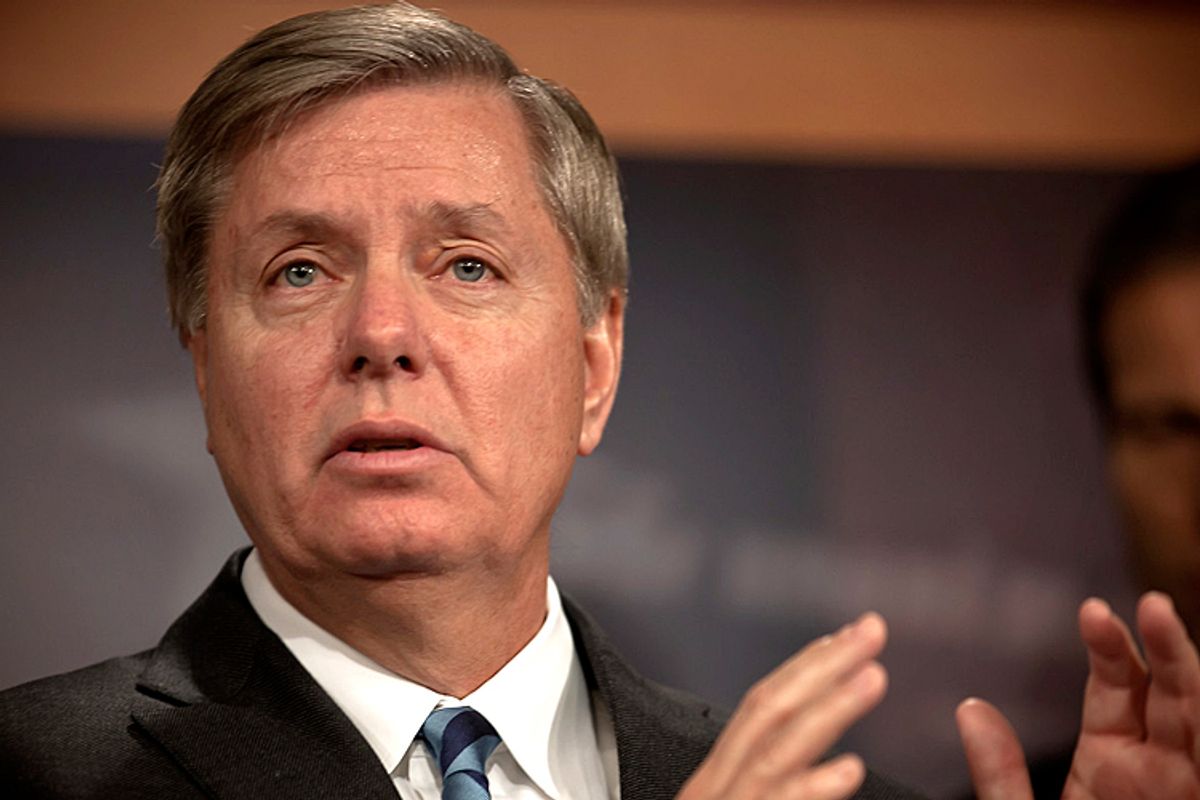Is Lindsey Graham serious about running for president, or is he just pretending to run for president? That's the big political question of the moment. Just kidding, it's not nearly the big political question of the moment, but let's, er, pretend that it is just for kicks. The best heuristic for determining whether candidates are serious or just pretending -- i.e., keeping their name out there just so the stupid shiny-object-chasing media pays attention to them (check!) -- is a matter of timing. Have they been visiting early primary states, chasing down staffers, carefully calibrating their positions and so on, for some time? Or did they only just mention that they might run, sort of offhandedly, within the last couple of months?
This test would suggest that Lindsey Graham is definitely only pretending to run for president to get attention. He loves attention -- and rarely has trouble getting it. At first blush, it seems unusual that the senator, who appears 10 times on each Sunday talk show each week, would think that there was yet more attention out there for him to garner. But he understands that if you say you may run for president, there are entire new frontiers, soaring vistas yet unexplored, of media attention awaiting your input and willing to aggrandize your every word.
If Lindsey Graham is merely pretending to run for president, it's working. He is exerting his influence over the field, setting in motion debates that other candidates may not like to have. That's because Graham's politics, while conservative, are heterodox around the edges. They do not fit neatly within the conservative consensus.
On domestic policy, and especially tactics for achieving domestic policy, he's more of what we might call a realist. He believes that climate change is a problem and the GOP needs to come up with a plan to address it. He supports comprehensive immigration reform legislation that he co-authors, something that can't be said of all co-authors of comprehensive immigration reform legislation. And he doesn't have much patience for the constant brinkmanship over government funding and debt ceiling bills that Ted Cruz et al. have turned into such a failed art form.
On foreign policy, meanwhile, Graham is somehow more hawkish than his comically hawkish party. Like his dear pal John McCain, there is no conflict on God's green earth for which Graham does not want to apply the hardest available line, whether that's direct United States military intervention or arming some hapless group he's read about in the papers. Lindsey Graham's foreign policy might best be summed up with his latest stance on sending arms to Ukraine to help in its fight against Moscow-backed separatists. This is a position that has all sorts of glaringly obvious red flags but nevertheless enjoys soft bipartisan support, because post-Cold War American foreign policy is still based on childish gut feelings about "standing up to the Russians." And why does Graham, in particular, support sending arms? Not necessarily because it would work, but because it would make him "feel better."
Graham occupies the most hawkish, interventionist pole among prominent members of the Republican Party. And now that he has the benefit of being a "possible presidential candidate," that lends his opinions a critical perch. All of the potential candidates are trying to out-right each other in all areas of life, and Graham sets the bar for foreign policy chest-thumping within the field.
This means that every other presidential candidate will be asked if they agree with, say, Graham's plan to send 10,000 ground troops into Iraq and Syria to fight ISIS. Graham is, so far, the only candidate who actively supports deploying combat troops en masse to engage in a ground war with the Islamic State. That puts other candidates in a box. They don't want to overtly say, Oh hell yeah, let's have a *ground war in Iraq and Syria*, because that's an insane position that so far only Lindsey Graham is insane enough to throw out there. But they also don't want to "look weak" in their appeals to the Republican primary electorate. So they say something like, we have to be "prepared" to do that, or the option shouldn't be "taken off the table." They don't want to talk about sending ground troops into Iraq and Syria. But now that Lindsey Graham is a "potential presidential rival," they have to, and there's even an over/under of 10,000 with which to negotiate.

Shares